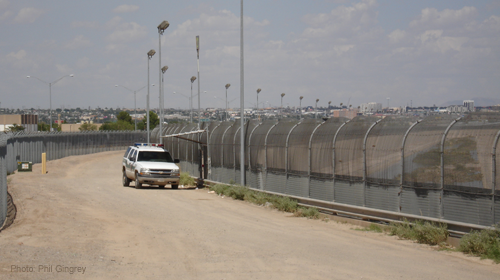
Lots happened this week to hearten those concerned about distorted portrayals of the southwest border as a crisis zone when the fact is that cities like El Paso and San Diego are among the in the country and migrant apprehensions are near a .
First, on Tuesday, the tragic cost of failing to match Customs and Border Protection's (CBP) burgeoning resources with adequate oversight and accountability was underscored by to a disappointing Office of Inspector General on CBP's troublingly frequent, and often deadly, uses of force. As Vicki Gaubeca, director of the ACLU of New Mexico's in Las Cruces, N.M., about CBP's track record: "If any metropolitan police department was involved in 19 fatal shootings in the span of two years, we would be appalled and would expect that they would look at best practices for other agencies to reduce use-of-force incidents, like body-worn cameras for officers."
Second, a day later, Rep. Roybal-Allard (D-Calif.) introduced the timely Protect Family Values at the Border Act. It responds to years of reported abuses like the Department of Homeland Security's (DHS) that include middle-of-the-night expulsions placing repatriated migrants in harm's way, as well as an appalling lack of enforceable, basic short-term custody standards in CBP jail facilities. This bill should be incorporated into immigration reform legislation as a pillar of humane border enforcement.
Sadly, a CBP "" has taken hold under the false banner of security – a mindset compounded by CBP's out-of-control and harassment at checkpoints. Border Patrol enforcement should be aimed at real border security threats, but it's not.
Instead, the effect is mass of families with U.S. citizen children. One in four migrants reports by Border Patrol agents. Rep. Roybal-Allard's bill protects vulnerable migrants, with special care for women and children, by prioritizing family unity and honoring American values through minimum detention conditions. Enacting the bill's provisions would mean adequate nutrition and medical care in CBP custody, as well as a requirement that the government return migrants' property – money and identity documents, now , without which they are vulnerable to abuse after being deported.
Rep. Roybal-Allard's bill would protect migrants like "Amelia." As recounted in a filed by earlier this year, Amelia was one of several migrants apprehended in Texas and taken by CBP to what officers called the hielera ("freezer" or "icebox"). After suffering sexual violence, Amelia had fled to the United States with two sisters and her five year-old niece. The hielera was a freezing-cold cell without beds or chairs:
Amelia's lips chapped and split, her face hurt and peeled. Her sisters' and her niece's lips and fingertips turned blue. They were forced to sleep on the concrete floor without even a blanket. They huddled together on the floor at night for warmth, but slept very little. They had no access to a bath or shower. They were not provided with even the most basic personal hygiene products like toothbrushes, toothpaste, combs, or soap. Nor were they ever provided with a change of clothing. They were fed only once or twice a day, and received no more than a single sandwich.
Amelia's is not an isolated allegation; "[d]etainees routinely officers threaten that if they don't sign deportation orders, they will be sent somewhere even worse than the hielera." CBP is now the nation's largest law enforcement agency and it's long past time for a "surge" in oversight and accountability to catch up with its wasteful border-security resources, which Rep. Rogers (R-Ky.) has "a sort of a mini industrial complex syndrome [that] we're going to have to guard against . . . every step of the way."
Congress should lift up and affirm humane treatment of southwest border communities and migrants through support for the Protect Family Values at the Border Act.
Learn more about immigration reform and other civil liberties issues: Sign up for breaking news alerts, , and .

